Real Estate Contracts
10 most important real-estate forms you can't ignore
Thus the avalanche begins....
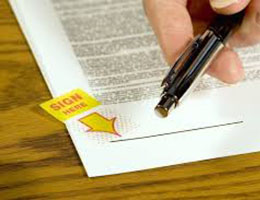
If you're buying or selling a home, make way for the ensuing avalanche of documents, online or on paper. But which are absolute musts to read all the way through?
Here are 10 of the most important documents that will come your way as you venture through your transaction journey. Experts say that every homeowner must be familiar with these financial records, legal certificates and lists. They all vary widely in length, depending on your location and the scope and size of the residential deal. Some often are just a page or 10. Some can compose mini-booklets.
But read them and read on. Or.... Click here to jump to the bottom to find the forms.
Buyer’s-agent contract

Trust means so much in any real-estate transaction. We hate to be cynical, but buyers should make sure they get that trust on paper, signed by your real-estate agent if you are using one. Is an agent simply out for a slice of the sale money and pushing you into a sketchy neighborhood or an unfit home? This particular document, also called the "buyer representation agreement," will give you peace of mind — legally based — that he is truly working as your advocate.
"Buyers need to make sure that the [agent] is looking out for their best interest. That's what this document does," says Dominic Cardone, regional vice president for the National Association of Realtors and a partner and broker with Keller Williams Real Estate in Media, Pa., outside Philadelphia.
Seller's property-disclosure statement

Buyers have a right to know about all of the quirks, cracks and glitches that home sellers have discovered in their property but have not repaired or addressed. Consider this report a window into some of the headaches you may be inheriting if you choose to purchase and inhabit the place. "The seller has to disclose known property defects," Cardone says. "The form has all sorts of questions: Does the roof leak? Does the air conditioning work? It is very important for the buyer to have this document before they make their offer."
Take the necessary time to read this litany of flaws, small and large. Prospective buyers often fail to do so, says Karyn Anjali Glubis, a real-estate broker in Tampa, Fla. "Most people briefly scan this document but don't ask questions if things aren't filled in correctly," Glubis says. "It is not only important to receive one but to also know the details of the document."
Purchase agreement
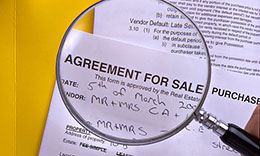
This is "without a doubt" one of those most important documents on this list, Cardone says. The purchase agreement, also called the "agreement of sale," contains several sections that are vital to buyers. The "inspection contingency," or home-inspection report, allows a professional house-defect sleuth to peruse every cranny of the abode to check the structure's quality and safety and to point out any potential problems, such as external drainage issues or aging shingles. Homebuyers normally foot the bill for such an inspection.
Buyers also will find in this file the "appraisal contingency" — essentially, an ethical backstop to certify that you are paying market value. "If you are taking out a loan, the lender is going to hire an appraiser," Cardone says. "The appraiser really represents the lender, but the appraisal contingency is important to the buyer because it assures that he is getting a fair price."
Financing and appraisal contingency addendum
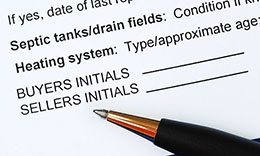
All sellers should get to know this document, which is an addendum to the purchase agreement. "As a seller, it's natural to focus on the contract offer price," says Wendy Slaughter, president of the Wendy Slaughter Team at Re/Max Advantage Realty in Fulton, Md. "However, it's important for sellers to thoroughly examine and consider all terms of the contract. The financing terms are very important, and this addendum outlines some critical steps, including how quickly the appraisal will be ordered and how each party will respond should the appraisal come in under the offered price."
Pay close attention to the deadlines outlined in this document. If you fail to respond to each listed request within the required time, your silence could mean that you've waived your right to negotiate the lower value with the appraiser, Slaughter says.
Inclusions/exclusions notice

The seller provides this list to the buyer and to the buyer's agent. The style and content of this document vary from state to state, but the fundamentals are the same. "Be sure to check to see if the washer, dryer, refrigerator and other large appliances will be included in the sale," Slaughter says. "Also note the exclusions — those items the sellers are excluding from the sale and removing from the property. Nothing is worse than doing the final walk-through and realizing the refrigerator, the dining room chandelier and the $5,000 play set from the back yard are gone," she says.
Title-insurance policy
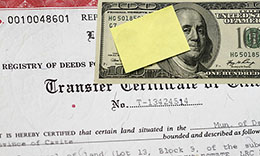
This document — which includes a "title search," also called a "title report" — makes certain that the property you're about to buy is marketable as well as free and clear of all liens and legal encumbrances. "This is an unusual insurance policy," Cardone says. "Unlike most insurance policies, where you pay a premium every year or every quarter, this is a policy where you pay one time for coverage."
"Think of the title report as a little legal private eye, checking the paperwork pipeline and guaranteeing that the previous mortgages have all been paid off and that there are no other claims on the property's title," Cardone says.
Mortgage
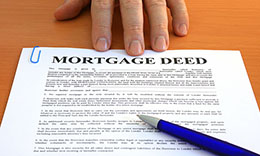
Yes, this is a document, not just the biggest bill you pay each month. "When you get mortgage financing, the lenders require you to sign two separate documents at the closing," Cardone says. "One is called the mortgage. The other is called the promissory note," which we'll describe in the next section. Your mortgage is the security or the collateral for the loan — or the note. "It's like going to a pawn shop and getting money from them and handing them a diamond ring," Cardone says. "Now they have the collateral."
Adding to its complexity: Twenty-eight states don't call it a mortgage; they label it a "deed of trust." A deed of trust is signed over to the bank, and a trustee, hired by the bank, holds the deed.
Promissory note
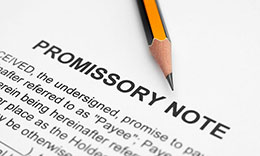
"It's all in the name: The note is your promise to pay the amount due on your home," Cardone says. "Everyone signs a promissory note at settlement, unless you pay in all cash. Promissory notes in real estate are different than promissory notes used in other forms of lending. "Your house is collateral, and your bank can come after it if you don't pay," Cardone says.
Property deed

This lists the owner of the property and includes a legal description of the home. At closing, most buyers get the deed to the house. "The property deed then gets recorded at the county courthouse and becomes public record. It puts the world on notice that you own the house," Cardone says. The mortgage document also is recorded. "That states for the public record that the buyer has a lien on the property," Cardone says. "It tells the world how much the original mortgage was, but it doesn't say how much you owe today," he says. "People just know there's a lien."
Association documents

Not every residence, of course, is part of a homeowners association or condominium association. But owners who fall under these strict mandates should know them intimately. "They list all the things you can can't do when living in the property, such as, you can't you have a dog, or you can't have a dog over 35 pounds, or you can't put a clothesline up in your yard," Cardone says. "In the old days, we used to call them 'deed restrictions.'"
HOA documents are different from city or town zoning codes, which also offer a litany of do's and don'ts.
Article originally by Bill Briggs of SwitchYard Media
Real Estate Forms for Do It Yourself
When selling, buying, or leasing real estate it is very important, and required in many states, to have properly executed written agreements. The links below provide access to a library of real estate legal forms specific for every state in the United States. Each form can be previewed before purchase to ensure that the form is the correct one for your specific need.
Rental & Lease Forms
Apartment Lease Combo Package

- Standard Package
Premier Residential Lease Combo Package

- Premier Package
Commercial Lease Forms Combo Package

- Premier Package
Buyer & Seller Forms
Real Estate Owner Combo Package

- Standard Package
Real Estate Purchase & Sale Combo Packages

- Premier Package
Affidavit of Title

- Standard Package

